CATALOG NO. B110-2022
American River

American River closed
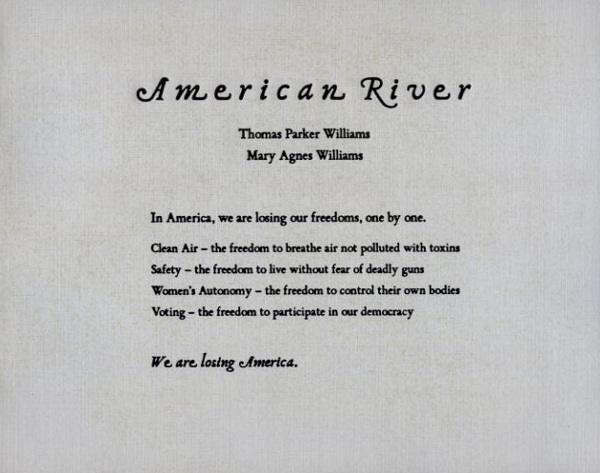
American River title page

American River open
In America, we are losing our freedoms, one by one.
Clean Air – the freedom to breathe air not polluted with toxins
Safety – the freedom to live without fear of deadly guns
Women’s Autonomy – the freedom to control their own bodies
Voting – the freedom to participate in our democracy
We are losing America.
Specifications - Edition of 12
Book - 7.25” x 9.25” x .6” Neenah Classic Linen, 6 folded panels, size 7" x 17.75" unfolded, accordion bound, opens to 106.5"
Covers - Paper over board with oil-based pochior image
Illustrations - 6 original images hand printed with 41 pochoir mylar stencils;
Inks - Oil-based relief inks and dry pigments in burnt plate oil
Text - Letterpress printed from polymer plates
Thomas Parker Williams - Concept, design, illustrations, pochior, printing, binding.
Mary Agnes Williams - Concept, text layout, original and selected text, printing.
Collections
Permanent collections -
Swarthmore College McCabe Library, Special Collections
Scripps College Denison Library, Special Collections
Free Library of Philadelphia Print and Picture Collection
Pius XII Memorial Library at Saint Louis University
Penn State University
Binghamton University, NY
James Madison University
Vanderbilt University
UC Irvine Library Special Collections
Topeka and Shawnee County Public Library

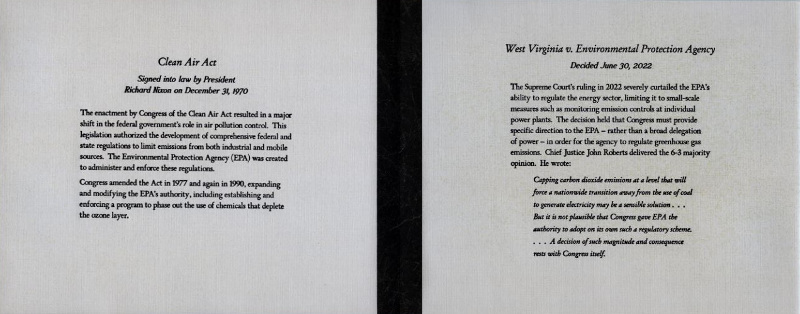
Clean Air Act Signed into law by President Richard Nixon on December 31, 1970
The enactment by Congress of the Clean Air Act resulted in a major shift in the federal government’s role in air pollution control. This
legislation authorized the development of comprehensive federal and state regulations to limit emissions from both industrial and mobile
sources. The Environmental Protection Agency (EPA) was created to administer and enforce these regulations.
Congress amended the Act in 1977 and again in 1990, expanding and modifying the EPA’s authority, including establishing and
enforcing a program to phase out the use of chemicals that deplete the ozone layer.
West Virginia v. Environmental Protection Agency Decided June 30, 2022
The Supreme Court’s ruling in 2022 severely curtailed the EPA’s ability to regulate the energy sector, limiting it to small-scale
measures such as monitoring emission controls at individual power plants. The decision held that Congress must provide
specific direction to the EPA – rather than a broad delegation of power – in order for the agency to regulate greenhouse gas
emissions. Chief Justice John Roberts delivered the 6-3 majority opinion. He wrote:
"Capping carbon dioxide emissions at a level that will force a nationwide transition away from the use of coal
to generate electricity may be a sensible solution . . . But it is not plausible that Congress gave EPA the
authority to adopt on its own such a regulatory scheme.. . . A decision of such magnitude and consequence
rests with Congress itself."

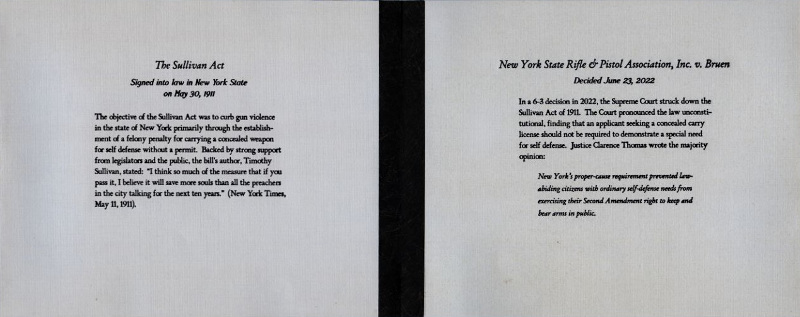
The Sullivan Act Signed into law in New York State on May 30, 1911
The objective of the Sullivan Act was to curb gun violence in the state of New York primarily through the establishment
of a felony penalty for carrying a concealed weapon for self defense without a permit. Backed by strong support
from legislators and the public, the bill’s author, Timothy Sullivan, stated: “I think so much of the measure that if you
pass it, I believe it will save more souls than all the preachers in the city talking for the next ten years.” (New York Times,
May 11, 1911).
New York State Rifle & Pistol Association, Inc. v. Bruen Decided June 23, 2022
In a 6-3 decision in 2022, the Supreme Court struck down the Sullivan Act of 1911. The Court pronounced the law unconstitutional,
finding that an applicant seeking a concealed carry license should not be required to demonstrate a special need
for self defense. Justice Clarence Thomas wrote the majority opinion:
"New York’s proper-cause requirement prevented law-abiding citizens with ordinary self-defense needs from
exercising their Second Amendment right to keep and bear arms in public."

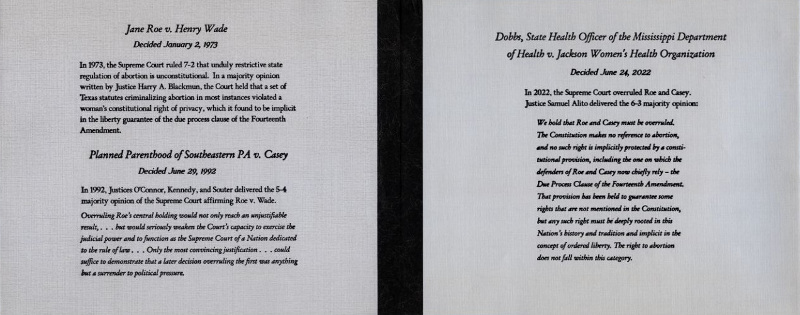
Jane Roe v. Henry Wade Decided January 2, 1973
In 1973, the Supreme Court ruled 7-2 that unduly restrictive state regulation of abortion is unconstitutional. In a majority opinion written by Justice Harry A. Blackmun, the Court held that a set of Texas statutes criminalizing abortion in most instances violated a woman’s constitutional right of privacy, which it found to be implicit in the liberty guarantee of the due process clause of the Fourteenth Amendment.
Planned Parenthood of Southeastern PA v. Casey Decided June 29, 1992
In 1992, Justices O’Connor, Kennedy, and Souter delivered the 5-4 majority opinion of the Supreme Court affirming Roe v. Wade.
"Overruling Roe’s central holding would not only reach an unjustifiable
result, . . . but would seriously weaken the Court’s capacity to exercise the judicial power and to function as the Supreme Court of a Nation dedicated
to the rule of law . . . Only the most convincing justification . . . could
suffice to demonstrate that a later decision overruling the first was anything but a surrender to political pressure."
Dobbs, State Health Officer of the Mississippi Department of Health v. Jackson Women's Health Organization Decided June 24, 2022
In 2022, the Supreme Court overruled Roe and Casey. Justice Samuel Alito delivered the 6-3 majority opinion:
"We hold that Roe and Casey must be overruled. The Constitution makes no reference to abortion, and no such right is implicitly protected by a constitutional
provision, including the one on which the defenders of Roe and Casey now chiefly rely – the Due Process Clause of the Fourteenth Amendment.
That provision has been held to guarantee some rights that are not mentioned in the Constitution,
but any such right must be deeply rooted in this Nation’s history and tradition and implicit in the
concept of ordered liberty. The right to abortion does not fall within this category."

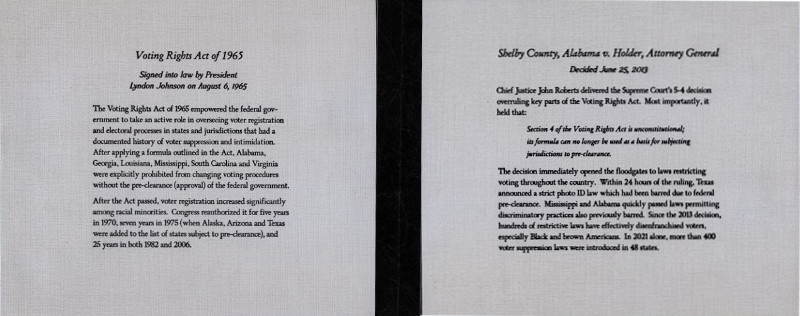
Voting Rights Act of 1965 Signed into law by President Lyndon Johnson on August 6, 1965
The Voting Rights Act of 1965 empowered the federal government to take an active role in overseeing voter registration
and electoral processes in states and jurisdictions that had a documented history of voter suppression and intimidation.
After applying a formula outlined in the Act, Alabama, Georgia, Louisiana, Mississippi, South Carolina and Virginia
were explicitly prohibited from changing voting procedures without the pre-clearance (approval) of the federal government.
After the Act passed, voter registration increased significantly among racial minorities. Congress reauthorized it for five years
in 1970, seven years in 1975 (when Alaska, Arizona and Texas were added to the list of states subject to pre-clearance), and
25 years in both 1982 and 2006.
Shelby County, Alabama v. Holder, Attorney General Decided June 25, 2013
Chief Justice John Roberts delivered the Supreme Court’s 5-4 decision overruling key parts of the Voting Rights Act.
Most importantly, it held that:
"Section 4 of the Voting Rights Act is unconstitutional; its formula can no longer be used as a basis
for subjecting jurisdictions to pre-clearance."
The decision immediately opened the floodgates to laws restricting voting
throughout the country. Within 24 hours of the ruling, Texas announced a strict photo ID law which had been
barred due to federal pre-clearance. Mississippi and Alabama quickly passed laws permitting discriminatory
practices also previously barred. Since the 2013 decision, hundreds of restrictive laws have effectively
disenfranchised voters, especially Black and brown Americans.
In 2021 alone, more than 400 voter suppression laws were introduced in 48 states.

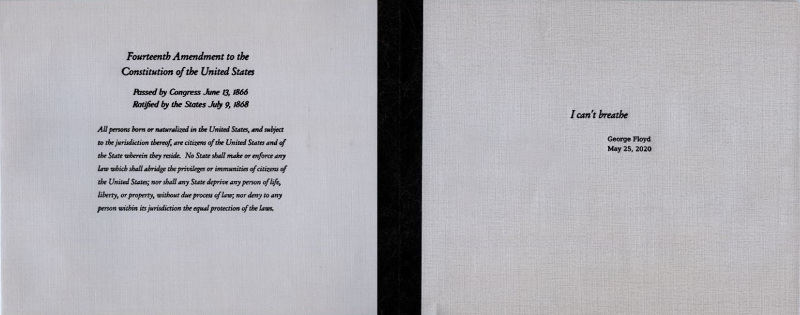
Fourteenth Amendment to the Constitution of the United States Passed by Congress June 13, 1866 Ratified by the States July 9, 1868
All persons born or naturalized in the United States, and subject to the jurisdiction thereof, are citizens of the United States and of the State wherein they reside. No State shall make or enforce any law which shall abridge the privileges or immunities of citizens of the United States; nor shall any State deprive any person of life, liberty, or property, without due process of law; nor deny to any person within its jurisdiction the equal protection of the laws.
I can't breathe
George Floyd
May 25, 2020
